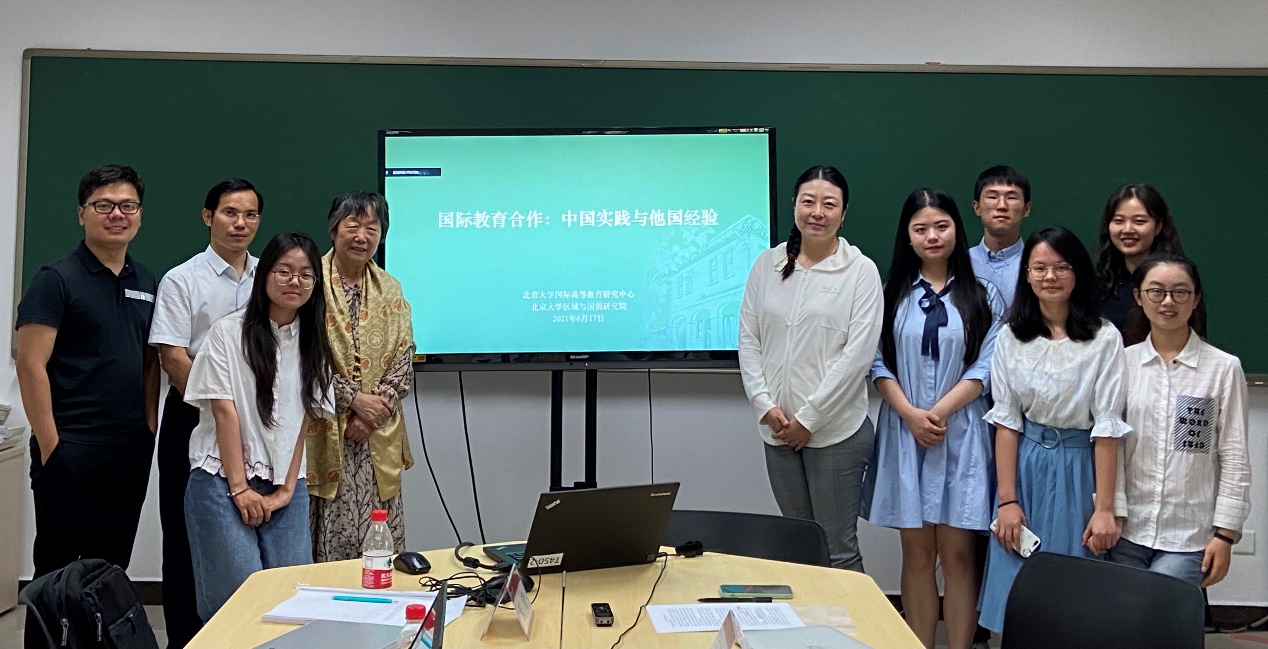The advance of globalization has promoted the thriving development of education globalization and internationalization. Despite the impact of the COVID-19 epidemic, international cooperation is still growing. In the new era, how should we better expand the opening-up of education and push high-qualified education resources to "go overseas"? In the face of challenges in the post-epidemic era, what can we learn from the experience of other countries' cooperation? On June 17, the Center of International Higher Education, Peking University, along with the Institute of Area Studies, Peking University (PKUIAS), held the 34th New Buds Salon, titled "Cooperation in International Education: The Practice of China and Experience of Other Countries." The salon invited PhD students and young scholars to engage in interdisciplinary discussion on the above questions. Prof. Ma Wanhua, director of PKU's Center of International Higher Education, was the organizer of the salon; Prof. Jiang Kai of the Graduate School of Education and Prof. Wang Jinjie, lecturer in the National School of Development, Peking University, served as the commentator; Wang Taoli, a PhD student in the Graduate School of Education, moderated the salon.

Zhang Qi, a PhD student in the Graduate School of Education, made a presentation on the organizational model and operation mechanism of education cooperation between China and other countries. He expressed his view that, under globalization, international higher education had become a new growth point in the education field. Among them, Sino-foreign cooperation in education was the manifestation of international higher education in China. It was of great significance for the introduction of high-quality foreign educational resources, the integration of the advantages of Chinese and foreign educational models, and the deepening of China's higher education reform. As it is a relatively new phenomenon, Sino-foreign cooperation in education exhibited distinct characteristics of system mixing, and it needed to take into account the national education system environment of both parties and the diverse demands of stakeholders.
Wang ChenHaozhi, a PhD student of PKUIAS, introduced the situation of the operation of overseas branches of Russian universities in Central Asia. He said that, after the independence of Central Asian countries, attracting well-known foreign universities to establish branch schools in their own countries has become an important means for them to promote the internationalization of their higher education. In this process, Russian universities have been very active. The operating experience of overseas branches of Russian universities in Central Asia showed that the establishment and development of overseas branches was a long-term systematic project, which required not only international cooperation, but also self-adjustment and adaptation by the universities; more importantly, it required grasping their needs and integrating into the local society.
The presentation of Zou Yujun, a PhD student at PKU's School of International Studies, focused on the evolution of the education policy of the Museveni government in Uganda. She opined that in the context of China's industrial transfer to Africa, whether education training in Africa could provide human resources for industrialization had become a hot-spot issue of concern in all walks of life. However, the setting of educational agendas in African countries was often shaped by the forces of the international community. How to set the priority of educational agendas to balance the influence of various international and domestic factors while adhering to their own development goals had become an important challenge to test the governing ability of African governments. She pointed out that the Museveni government had made education policies serve the national development strategies of different periods by highlighting and adjusting the educational agenda, which not only allowed Uganda to gain support from the international community, but also consolidated the foundation of domestic public opinion.
Yang Tirong, an assistant research fellow from the Southeast Asian Studies Center of South China Normal University, analyzed the difficulties and approaches of China's implementation of educational aid policies in Southeast Asia based on field theory. He said that education aid was an important way for China and Southeast Asian countries to carry out educational strategic interactions. It would not only improve the level of China's opening-up of education, but also help the development of education in Southeast Asian countries and contribute to the construction of the "China-Southeast Asian Community of Shared Future." He pointed out that research on the dilemma of policy implementation should pay attention to the diversity of policy implementation subjects, the power structure of the subjects and the cross-field effects of policies; furthermore, it needed to conduct a comprehensive analysis of the subject, content, and form of policy implementation.
Jiang Kai and Wang Jinjie respectively commented on the presentations of the four speakers and put forward suggestions on related issues. They opined that international education research should not be limited to descriptive research, but should combine relevant theories and choose appropriate perspectives for analysis and verification. In the analysis process, one could try to use qualitative analysis software to further improve the research. In addition, when reporting research results or research plans, one should pay attention to the elaboration of research methods. In conclusion, Prof. Ma Wanhua emphasized that the participation of international organizations such as the World Bank in higher education was a problem worthy of attention. Developing countries easily showed their dependence on the outside world in terms of their national development policies. Expanding the opening-up of education required careful study and cautious action.
In the Q&A period following their presentations, the speakers interacted with the audience members.


